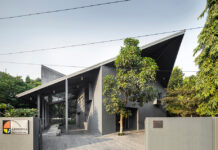
With the Public Gallery, which consolidates two new historical centers for the presentation of China’s social legacy, a significant part of the new social quarter in the Olympic Green in Beijing is finished. The outer plan makes reference to the capability of the structure, which – with its changing tone and light impacts made by the sculptural organizing of the veneer – is plainly noticeable from all over.
The gallery building marks the northern finish of Beijing’s Focal Hub and is not a long way from the Public Arena, the Bird’s Home, and the Asia Monetary Center and AIIB Central Command. Interestingly, an open door is given to introduce important assortments of Chinese expressions and artworks and things of immaterial social legacy at public level.
The elements of the new structure, which is 50 meters high, around 200 meters in length, and 75 meters heigh, result from the metropolitan plan rules for social structures along the Stream Yangshan. The structure contains three unmistakable correspondingly and primarily organized parts: the plinth worked with light-hued Xiu Shi rock, the coated middle region, and the copper-shaded principal body drifting above. This division into three sections implies that a roofed-over patio is made at a level of 13.50 meters, giving public space by and large round the structure. It is safeguarded by the six-meter cantilever of the rooftop, which additionally works as sun oriented evaluating for the presentation regions behind the coated veneer.
The two doorways to the gallery are set along its focal hub, in this way giving passageways to the square toward the east as well regarding the waterway bank toward the west. They lead to the common focal lobby and on to a multifunctional corridor with around 400 seats and the presentation lobby for the transitory showcase of intuitive configurations. The space is open through the level of the structure and gets sunshine through square rooftop lights. As guests advance along the overhangs to the presentation lobbies they appreciate changing vistas of the space. The itemizing of the wall and roof components resounds with the plan of the structure envelope concerning construction and variety. The illuminated hexagonal roof boards are suggestive of woven designs in Chinese specialties and make a quiet climate along the entrance halls.





The gallery capabilities are organized more than three stories, with the transitory displays designated to the coated transitional level and the extremely durable presentations to the two accounts of the principal building volume. The foundational layout of the structure with its enormous section free regions fits an extraordinary assortment of show situations. Space is deftly partitioned with room-high parcel components, and that implies that the two exhibition halls can undoubtedly be consolidated under one rooftop, despite the fact that they cover very particular subjects: from one viewpoint immaterial social legacy like dance and music, and then again Chinese expressions and specialties with various, once in a while tiny, objects.
The underlying example utilized in the shade wall veneer connects with the examples and designs found in the workmanship and specialty displays. With its sun powered screening it produces a particular air with dappled light that is suggestive of customary Chinese insides. The three-layered impact of the structure envelope is accomplished with the huge hole of very nearly one-and-a-half meters between the external and inward exteriors and by a space structure comprising of pultruded profiles with a mat copper-shaded covering that have been woven into a network like help, projecting outward and internal in the upward planes.






